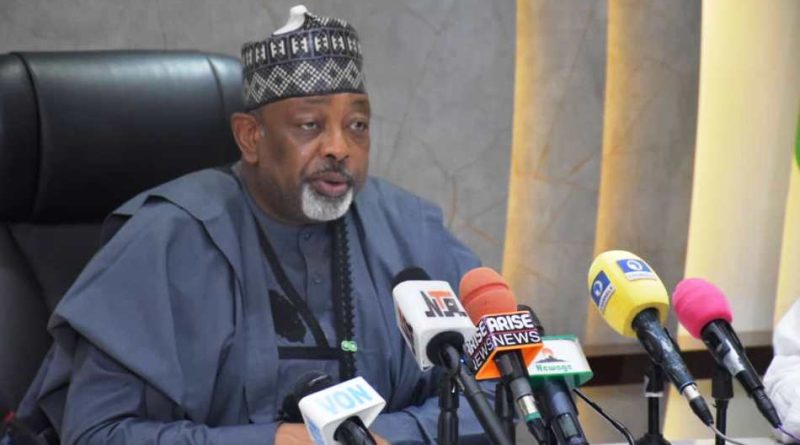FG to set minimum price for farmers, buy up harvests to stabilse food market
Abubakar Kyari, Minister, Federal Ministry of Agriculture and Food Security (FMAFS)
…farmers lament persisting insecurity, limited finance, poor infrastructure
…experts urge govt to regulate commodity market intermediaries to curb hoarding
The federal government said it would soon introduce a Guaranteed Minimum Price for agricultural produce for farmers and undertake large-scale offtake of farm harvests.
Abubakar Kyari, minister of agriculture and food security, who announced this on Tuesday at a breakout session on “catalysing Agricultural Transformation: Capital, Innovation and Growth” at the ongoing Nigeria Economic Summit said the measure aims to protect farmers and consumers amid price volatility.
“We’re looking at how to balance the citizens’ welfare, and also the farmers welfare”, he said.
The minister explained that the move followed lessons from last year’s food price volatility and hoarding by commodity dealers, which worsened inflation and triggered widespread hunger protests in August. “There was a massive hoarding aspect. There was a farmee who said he will not sell his maize until price g gets to N150,000, but today, he’s begging to sell at 30,000″, Kyari said.
He also cited last year’s paddy rice market as an example, when farmers sold at N350,000 per tonne while market prices climbed to N800,000, highlighting inefficiencies between production costs and retail prices. “There was clearly a dislocation somewhere,” he said.
The minister said government interventions also includes a 150-day window to release stored commodities, were among the measures introduced to ease supply shortages.
Kyari also said the government was revamping financing mechanisms for smallholder farmers, who form the bulk of Nigeria’s producers but lack access to capital and modern equipment. He disclosed that President Bola Tinubu had approved the recapitalisation of the Bank of Agriculture, with ₦250 million already released to improve access to credit for smallholders.
He said government intends to support smallholder farmers to become largeholder farmers, and is currently developing a national register of smallholder farmers.
The minister added that soil mapping was underway in partnership with private firms to improve fertiliser formulation and crop yields, while decrying the rising cost of fertiliser from about ₦35,000 to as high as ₦60,000blaming it on supply bottlenecks and limited port capacity.
He also disclosed that the government was collaborating with the Renewable Infrastructure Fund to address logistics constraints and exploring the use of local potash deposits to reduce import dependence.
Read also: Edun says govt funds still outside TSA, CBN, vows full recovery
The minister acknowledged that insecurity, inadequate infrastructure and limited financing remain key barriers to productivity but expressed optimism that the ongoing reforms and investments would strengthen Nigeria’s food system. He informed that Preliminary findings from the 2025 National Agricultural Development (NAD)indicates that the country recorded a higher harvest this year than in 2024 suggesting that Nigeria is on the right trajectory despite ongoing challenges.
At the session, Segun Adaju, an entrepreneur, decried that worsening insecurity has forced many farmers like himself to abandon their farmlands. “Bandits are the problem we are tired of paying ransom”, he said.
For Okeke Chukwujekwu, co-founder ocattu Nigeria, noted that infrastructure remains a major problem.He said the lack of access roads to farms is also discouraging young people from engaging in agriculture, and urged greater collaboration among all tiers of government to address the problem.
Aisha Bashir, MD/CEO, Cam diary foods Ltd, lamented the lack of access to finance, including loans from banks which she said has severely affected the survival of her business.
Olapeju Ibekwe, chief executive kfficer of Sterling One Foundation, acknowledged that while insecurity continues to hamper productivity, Nigeria still has enormous potential to expand output. He pointed out that the country has between 35 and 37 million hectares of arable land, compared to the Netherlands’ two million hectares, yet the latter maintains a thriving agricultural industry.
“As we deal with insecurity, the places we can secure can help quadrupple production”, he said.
Ibekwe further called for the regulation of intermediaries in the commodity market to curb distortions and improve transparency. He warned that without oversight of large-scale buyers, the government would remain reactive, intervening only after market disruptions occur.
Read also:Processed cocoa products more profitable to Nigeria’s economy than raw exports – Alamu
Ibekwe further called for the regulation of intermediaries in the commodity market to curb distortions and improve transparency. She warned that without oversight of large-scale buyers, the government would remain reactive, intervening only after market disruptions occur.
“That area is completely unregulated, and it’s huge area of the ecosystem, otherwise the government will continue to scamper, looking for warehouses to break in”, he said.

